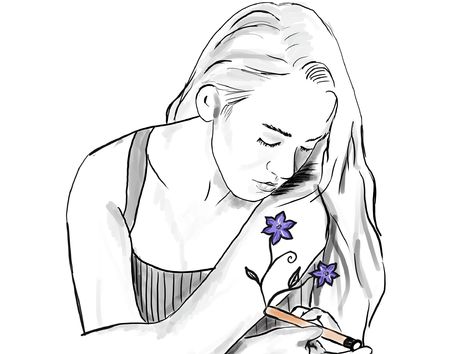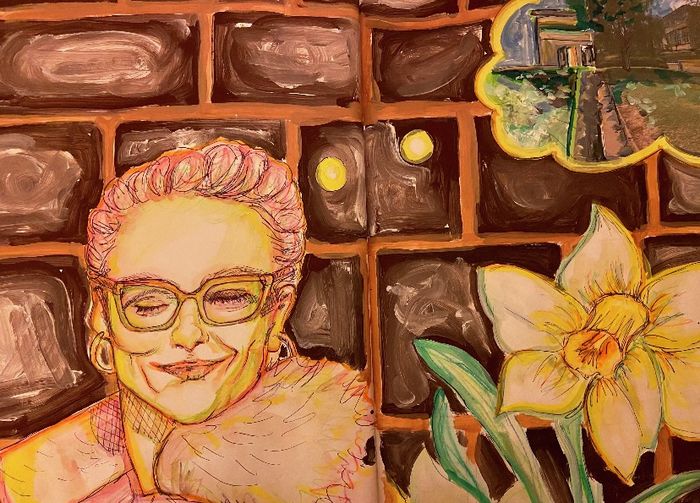What it means to be ‘healthy’ with a chronic illness
Martha Bowsher shares her experiences being diagnosed with a chronic illness in the early days of the pandemic and how it’s redefined her relationship with what it means to be ‘healthy’

Content Note: This article contains detailed discussion of chronic illness and distress
I was diagnosed with type one diabetes last March (a month which most people remember for other reasons). Chronic illnesses are classified as any condition that lasts for more than a year. As type one diabetics, our disability has no cure. I thought this meant I would be unhealthy for the rest of my life.
“I felt like my body was a baby that needed someone to take care of it, but that person was me”
I had been dangerously unwell from a lack of treatment before my diagnosis. When I finally went to A & E, I was immediately swarmed by concerned doctors and then rushed around wards day and night as the number of COVID patients grew. I did not think I would be leaving alive. This was not a great introduction to my illness, to say the least. Once I was discharged, I still felt many repercussions of going so long untreated: my hair fell out, stairs made me dizzy, and my eyesight was blurred. But the hardest part was knowing I would never truly be better. I was disabled for life. I felt like my body was a baby that needed someone to take care of it, but that person was me. I was both helpless and faced with overwhelming responsibility.
Lots of stories around illness follow a comforting arc of a character becoming ill, recovering from it and then being restored to health. Sometimes writers and filmmakers will creepily fetishize a female protagonist who dies tragically young, as with Hazel Grace Lancaster in The Fault in Our Stars. So, what does that mean for someone who is perpetually ill but not planning on dying any time soon? What is my narrative and where do I go from here?
Well, I am still ill a year later. But I feel healthy. Before my diagnosis, I would unconsciously couple disability with an unhealthy body. Now I think we should make an important distinction. To be healthy really means to be in good physical or mental shape. How I measure this has changed. A healthy week includes dangerous drops in my blood sugar. I must self-administer injections to my stomach and thighs four times a day and constantly visit the hospital for a routine check. Reconceptualising these actions as ways of maintaining my health has been so helpful while accepting this new life. I know what it is like to have my illness unmanaged. I remember lying in my bed unable to move. Standing for a few minutes would cause my vision to blackout and I often could not eat at all. What has changed, however, is my ability to care for myself. I have slowly learned how to look after my body and its new requirements. I feel strong and healthy. I just have a different body with different needs.
“Perhaps the most helpful narrative to reclaim is a nonlinear one or to reject one entirely”
I am cautious, however, not to simplify my experience. I am not stoic or brave, which seems to be able-bodied people’s favourite way of concealing their disgust of us through a veiled compliment. I do not muscle through these obstacles without complaint. Of course, several daily tasks remain painful and challenging. I have to obsessively weigh and record all my meals. This helps me calculate the amount of carbohydrates that are in my food, which tells me how much insulin to inject. Doing maths, especially as a hopeless English student, every time I fancy a snack can wear me down. I sometimes have such mental fatigue that I choose to go hungry or do not bother carbohydrate counting. On these days, I definitely feel unhealthy, exhausted and frustrated. There may even be a month where work is overwhelming, and my health drops to the bottom of my priorities. I know no one else with a similar illness and so such experiences are isolating. Telling family or friends often just causes them distress, unable to find words of comfort or affirmation. My health and my attitude towards it, therefore, are in constant flux.
Perhaps the most helpful narrative to reclaim is a nonlinear one or to reject one entirely. My health is intertwined in every part of my life and packaging my entire existence into one storyline is ridiculous. Moreover, there are 17.5 million chronically ill people in the UK. Every single one of us will have vastly different relationships with our bodies. Not only will we all have different advantages and disadvantages, but we are all individuals. Trying to connect us all through one story is impossible. I have never felt freer than when I stopped trying to twist my experience to fit socially constructed expectations.
 News / Caius mourns its tree-mendous loss23 December 2025
News / Caius mourns its tree-mendous loss23 December 2025 Comment / Yes, I’m brown – but I have more important things to say22 December 2025
Comment / Yes, I’m brown – but I have more important things to say22 December 2025 News / Cambridge welcomes UK rejoining the Erasmus scheme20 December 2025
News / Cambridge welcomes UK rejoining the Erasmus scheme20 December 2025 News / CUP announces funding scheme for under-represented academics19 December 2025
News / CUP announces funding scheme for under-represented academics19 December 2025 Interviews / Politics, your own way: Tilly Middlehurst on speaking out21 December 2025
Interviews / Politics, your own way: Tilly Middlehurst on speaking out21 December 2025










